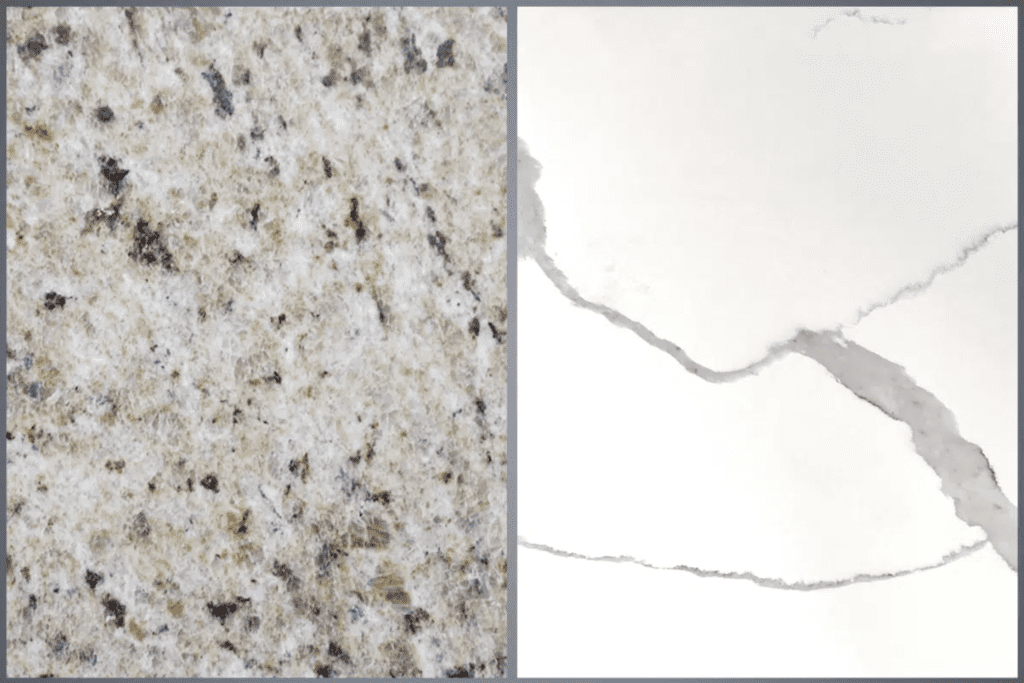
When it comes to the world of interiors, there are two materials that stand head and shoulders above the rest when it comes to countertops. Granite and quartz. And with these materials comes the age-old debate of which stone is better – the natural one, i.e., granite or the engineered one, i.e., quartz?
This debate is a classic one, and that’s because both offer so many benefits that make it difficult to choose between one or the other. Because at the end of the day, your countertop is more than just a slab you install in your kitchen or bathroom.
From helping you prep, prepare, and serve your meals in your kitchen, to housing your sink and storing your toiletries in your bathroom, this slab turns out to be quite a defining feature of the room and needs to be both aesthetic and functional. And, of course, they also need to be extremely durable.
So how do you go about choosing the one that suits your home best? We tell you what to look for.
Granite Or Quartz: Which One Should You Choose?
To help you pick, it’s always good to weigh the pros and cons of each and see which one fits your lifestyle better. Remember that your countertop is a hardworking zone, and it needs to be up to the mark to do its job well.
Granite: An evergreen option for countertops, granite is quarried straight from the earth and is hard to beat when it comes to durability. Add the fact that this natural stone looks stunning with the vast range of colors it comes in, and you have a winner.
From delicate swirls to interesting flecks, there’s no doubt that granite can make a good-looking addition to your room. But remember that it’s quarried, and every slab can look different. So, if a precise, uniform look is what you’re after, granite might not be your best choice.
When it comes to slabs being as uniform as possible, it is important to select the actual “lot” of granite you will be using rather than selecting from a generic sample. On the other hand, if you like your slabs with a bit of character, then you cannot go wrong with granite. It’s also resistant to stains, scratches, or spills.
However, it does need to be resealed periodically, making this an option that does require some maintenance on your part. Specially made cleaners and sealers can help take care of your granite slabs properly.
Quartz: Crushed quartzite, coloring pigments, and polymer resins combine to create this synthetic stone material. This fact also gives it the advantage of looking uniform, which is a plus point for those who prefer consistency in their design. If you are looking for a uniform look or a low maintenance marble looking option, quartz is the perfect solution!
However, the advantage a natural stone like granite has over quartz is that it is more heat resistant. That’s not to say it doesn’t come with its own share of advantages. For one, it doesn’t need to be sealed as it is a non-porous surface. It is also durable and pretty low maintenance with a surface that offers antimicrobial protection.
In addition, it is very easy to clean. But though it’s pretty easy to maintain and clean-ups are a breeze, as far as possible, stay away from harsh, abrasive cleaners or scouring pads, which can dull its surface. Instead, opt for one made especially for this material or even simply use warm water and a mild detergent.
Don’t set hot pans and pots directly on its surface, as it can damage the resin. Bleach, nail polish remover, and other alkaline materials should be avoided as well.
Contact Us Today
Picking a countertop is an investment. From embodying your preference of design to being able to fulfil the requirements you need it for, it involves money, time, and effort to put together.
At GranitePro, this is our area of expertise, and we go into detail to see which material works well for your home, keeping in mind your layout, space, design preferences, and uses of your countertop. Contact us today to see how we can help install a countertop that’s the right fit for your home.
